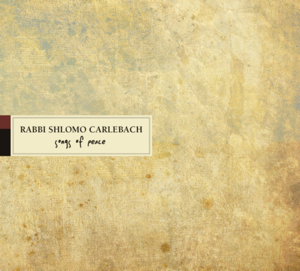I've got a happy heart right now. I'm back at my computer after a night at the
JCC Stephen Gottlieb Music Fest watching the
Shlomo Carlebach documentary
"You Never Know." All the way there and all the way back I was listening to a review copy of the new Sojourn Records album "Shlomo Carlebach - Songs of Peace" a posthumous release of material from a pair of 1973 concerts. This is as good as it gets, folks. I'm riding a serious Jewish high right now.

Carlebach was an amazing figure, a controversial
Lubavitch Chassidic rebbe who took his faith to the streets and lifted the hearts and souls of the people he met there. And in the process helped revolutionize Jewish music and prayer in both the traditional and liberal Jewish movements. If you hear someone pickup a guitar and sing a prayer in Hebrew, you're hearing Carlebach's echo (as well a few others).
While rough in pacing and erratic in focus, "You Never Know" is an excellent documentary. It is less about Carlebach than it is about his legacy and his impact on people. It avoids narrative, historic or biographical, and instead hops around in time and place letting a diverse set of people talk, dance and sing about how Carlebach had touched their lives. It paints a picture of a rebbe who was more interested in inspiring disaffected Jews than delivering lectures to frum yeshiva students. The cost of this was his reputation in traditional circles, the benefit was his success at his mission.

And it's important to remember that if you get a chance to listen to Songs of Peace. This is a concert. It has a stage, a singer, a guitar. It's also a prayer gathering and religious experience. Carlebach breaks from his songs to tell stories and teach. The album admirably captures both the music and teaching. I'm not Chassidic and can sometimes get overwhelmed by the mystical language that permeates Chassidic thought, but I could listen to Carlebach any time (and often do). He has a gift for making the ephemeral concrete and relevant to daily life.
Carlebach has a long discography. Wikipedia notes 23 albums (5 of which are available on
Sojourn Records) and I'm aware of a lot of other bootlegs and non-commercial recordings floating around. I'm not nearly enough of a connoisseur to say whether this is among the best of his records. But I can say whole heartedly that it's an excellent introduction. The recording has that wonderful audio distance of historic recording, but is clear and listenable. Carlebach's voice and guitar are in fine form and the teachings are well chosen, short and moving.
To hear samples from
Songs of Peace, check out the Sojourn Records website. For a quick hit of one of the giants of Jewish music, check this video out. YouTube has a ton of Carlebach. I chose this one because it's from the same time period as Songs for Peace
A couple of final notes. First, Sojourn Records also recently released a fine album by Carlebach's daughter
Neshama. It deserves, and will get, it's own review sometime next week. Second, I've got an .mp3 of a great lecture explaining some of the reasons that Carlebach was controversial in the orthodox community. I'd provide a link, but I can't find it on the web anymore. If you're interested let me know and I'll get it to you.
Finally,
the FCC wants you to know that I got no compensation for this review other than a free digital review copy of the CD. And I got in free to the movie because I was taking tickets. Isn't that exciting to know?
 Carlebach was an amazing figure, a controversial Lubavitch Chassidic rebbe who took his faith to the streets and lifted the hearts and souls of the people he met there. And in the process helped revolutionize Jewish music and prayer in both the traditional and liberal Jewish movements. If you hear someone pickup a guitar and sing a prayer in Hebrew, you're hearing Carlebach's echo (as well a few others).
Carlebach was an amazing figure, a controversial Lubavitch Chassidic rebbe who took his faith to the streets and lifted the hearts and souls of the people he met there. And in the process helped revolutionize Jewish music and prayer in both the traditional and liberal Jewish movements. If you hear someone pickup a guitar and sing a prayer in Hebrew, you're hearing Carlebach's echo (as well a few others).








4 comments:
Notice how at 2:50 Shlomo wants to repeat the A part but the audience goes into the B part and Shlomo goes with the flow? A very important lesson in songleading and chazanut. Because it's all about everybody singing, not me singing.
Jim...I hadn't noticed. Thanks for pointing that out. And your right. That's a textbook example of songleading.
You wrote: I've got an .mp3 of a great lecture explaining some of the reasons that Carlebach was controversial in the orthodox community. I'd provide a link, but I can't find it on the web anymore".
Perhaps you mean the mp3 of Rabbi Aaron Leibowitz's lecture dealing with why Reb Shlomo was controversial in the orthodox community. If so, I checked today and it is still at
http://www.mediafire.com/file/o0pzz7ye07bpgfc/Orthodoxys_LoveHate_Relationship_wit.mp3
Sincerely Yours,
Dr. Natan Ophir, Natan@JewishMeditation.org.il
Dr. Ophir... thanks. That's the one.
Post a Comment